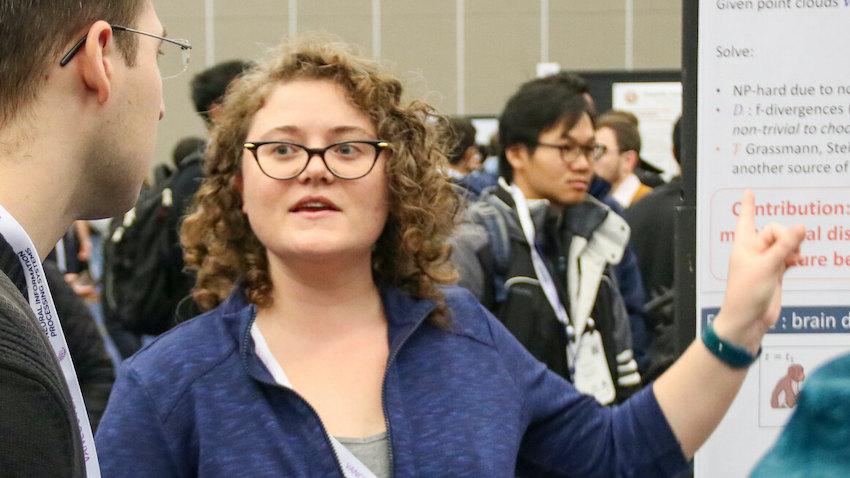
Unique Program Offers Entrepreneurial Experience for Computing Ph.D. Students
It’s rare to find a program that matches MBA and Ph.D. students together to help bring business ideas to life while offering credit toward a degree. TI:GER (Technology Innovation Generating Economic Results) is just such a program, providing hands-on experience in innovation and entrepreneurship, including work with actual ventures.
The program, housed within the Georgia Tech Scheller College of Business, allows full-time and Evening MBA students to earn a STEM concentration and allows Georgia Tech Ph.D. students from the colleges of Computing, Engineering, and Sciences to apply their credit hours toward their minor.

We sat down with Paige Cruver, MBA ’22, senior strategy consultant at Accenture, and former TI:GER student to hear how her experience in the program changed the trajectory of her career.
What was your concentration/degree?
TI:GER was my only 'concentration,' if you will. Scheller offers a great range of concentrations for focused learning, but I was only interested in the TI:GER program.
How did you find out about the TI:GER program?
I found out about the TI:GER program through an alumnus. When I was still weighing my options for business school, I connected with at least one alum and one current student who mentioned the TI:GER program and all of the cool things they were doing. When I decided to attend Georgia Tech, the TI:GER program was one of the first things I looked into as I planned my workload.
What made you decide to enroll in the program?
I enrolled in the program because I was interested in pivoting industries and functions, and I purposely sought out experiences that were uniquely different from the ones I'd had in my professional career. The TI:GER curriculum was new to me and seemed like it would offer hands-on experience with emerging products and companies. I also appreciated that the classes within the program were limited to those of us in the program.
Did you already have an idea/product/invention you wanted to work on within the program? If so, what was it?
While I was open to working with various companies and products, my specific interest was in healthcare and life sciences. Having previously earned my master’s in public health, but with work experience in an unrelated industry, I was keen to find my way back into that space. During my first semester in the TI:GER program, I was matched with a medical device company, which was a great match for my interests. I later worked with a retail technology company, which was a great experience as well.
When you finished the program, did you have a product ready to go to market?
My experience with the retail technology company did have a product ready to go to market. They'd been working with smaller companies on smaller contracts and were looking for ways to scale. It was fascinating to be able to see their previous success and help them translate that into insights to pursue their next opportunity.
If you were an MBA, what were your major responsibilities?
My major responsibilities as an Evening MBA student in TI:GER was conducting market research to build a competitive landscape; analyzing the data gathered from the research to provide insights to the client; helping with the pitch deck, if requested; and keeping an impartial mind when evaluating the various options the company could pursue.
If you were an MBA, what would be your major takeaways from being in the program?
My major takeaway as an MBA student in TI:GER is that things can change instantly. Companies are well served to keep some level of nimbleness in their approach to their business. Additionally, making sure the voice of the customer is reflected within and throughout the decision-making process can help mitigate the risk of a poor product-market fit in the future.
Can you describe how your experience enhanced your career after graduating?
TI:GER was a great way to build my resume with practical experience, and many of my experiences with TI:GER were woven throughout how I answered those common behavioral interview questions a potential employer asks. Oftentimes, the interviewer has never heard of a program like TI:GER, so I use it as a way to demonstrate that I'm not afraid to try new things and to take calculated risks.
Would you recommend the program to others? If so, why?
I'd ABSOLUTELY recommend the TI:GER program to others. If, like me, you're looking to do something different from what you were doing previously, or if the program’s curriculum piques your interest, let me be the one to help you make the decision!
I had a positive experience with the faculty, curriculum, and member organizations (Hello, CDL-Atlanta!), and the program’s structure is unlike most other programs at Scheller. I'd venture that anyone attending an MBA program is an overachiever - you may as well keep the trend going and apply for the TI:GER program.
Story courtesy of Scheller College of Business
Lorrie Burroughs, Communications Officer
As computing revolutionizes research in science and engineering disciplines and drives industry innovation, Georgia Tech leads the way, ranking as a top-tier destination for undergraduate computer science (CS) education. Read more about the college's commitment:… https://t.co/9e5udNwuuD pic.twitter.com/MZ6KU9gpF3
— Georgia Tech Computing (@gtcomputing) September 24, 2024


